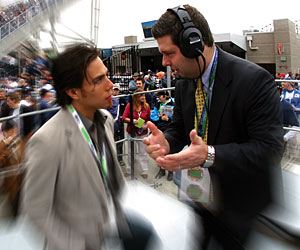Five years ago, the Seattle Seahawks football team was suffering the longest drought of playoff victories of any NFL team. As the team grappled with its image, fans were losing interest.

Bill Chapin (MBA ‘02) couldn’t fathom a time when he could ever lose interest in sports. “I grew up following the San Francisco 49ers and the Oakland Raiders,” says the northern California native and four-sport athlete. “The dream of playing in sports college died shortly after I realized everybody was better than me, but the dream of being with a sports team remained.”
In 2004, after serving management roles with the Mighty Ducks of Anaheim, San Diego Padres, Los Angeles Clippers, and Los Angeles Kings, Chapin was hired as the new director of marketing for the Seahawks. Who better to rekindle the passion of Seattle fans than a sports fanatic himself?
“We wanted to make fans feel proud, passionate, and connected,” he says. “In football, there are 11 men on the field at any given time, but in Seattle, we have a 12th man. The 12th man is the crowd.”
Years ago, the Seahawks retired the number 12 jersey as a tribute to their fans, but “that got away from us a little bit,” Chapin reflects. “When our new leadership came on board, we really took a look at some of the rituals in the past and reignited this concept.”
The 12th man became the crux of a new brand strategy for the Seahawks. Since then, the Seahawks’ home turf, Qwest Field, has become known as the loudest stadium in the NFL. In 2005 alone, crowd noise contributed to a league-high 24 false-start penalties; the Seahawks were falsely accused of pumping in artificial noise to distract the visiting offense.
Lo and behold, the Seahawks’ playoff slump ended in 2005 with a 20-10 NFC championship win over the Washington Redskins—a victory that paved the Hawks’ passage to the Super Bowl.
Thinking about that moment still sends shivers down Chapin’s spine. “The intensity and the noise from the fans was the loudest I’ve ever experienced. To be a part of that was very special.”
In 2009, the Seahawks organization welcome a brand new professional team to its family, the Seattle Sounders Football Club (soccer), and a whole new way to empower fans: “Democracy in Sports.”
“‘Democracy in Sports’ is the ability for season ticket holders and Sounders supporters to literally effect change within the organization,” says Chapin. “Every four years, all members of the Sounders Alliance can vote on our general manager. If they give him a vote of no confidence, he loses his job.”
Chapin has orchestrated the team’s launch, from the people’s vote on the team name, to the logo and brand new Sounders FC Web site. The site is the first in Major League Soccer history on which fans can voice their concerns, ideas, and suggestions directly to ownership and the general manager.
As marketing director for both teams, Chapin says the biggest reward comes from getting people excited about sports again. “I firmly believe that sports are part of the social fabric of our society,” he says. “Those guys sitting in seats 101 and 102 see a great play; next thing you know, they’re high-fiving each other, they’re hugging each other, yet they don’t even know each other’s names. Name one other place where that happens?”
